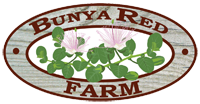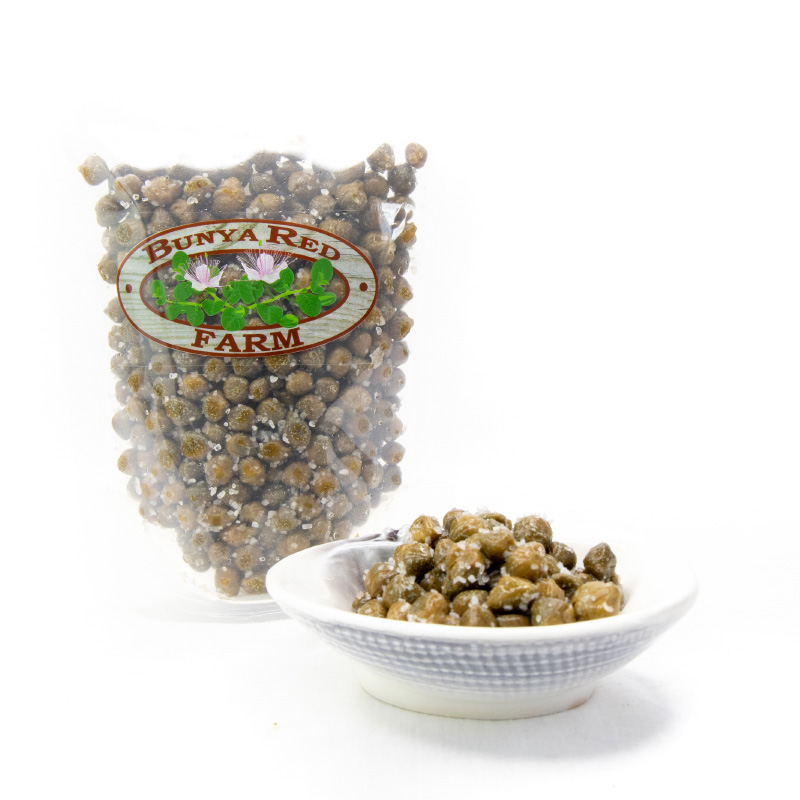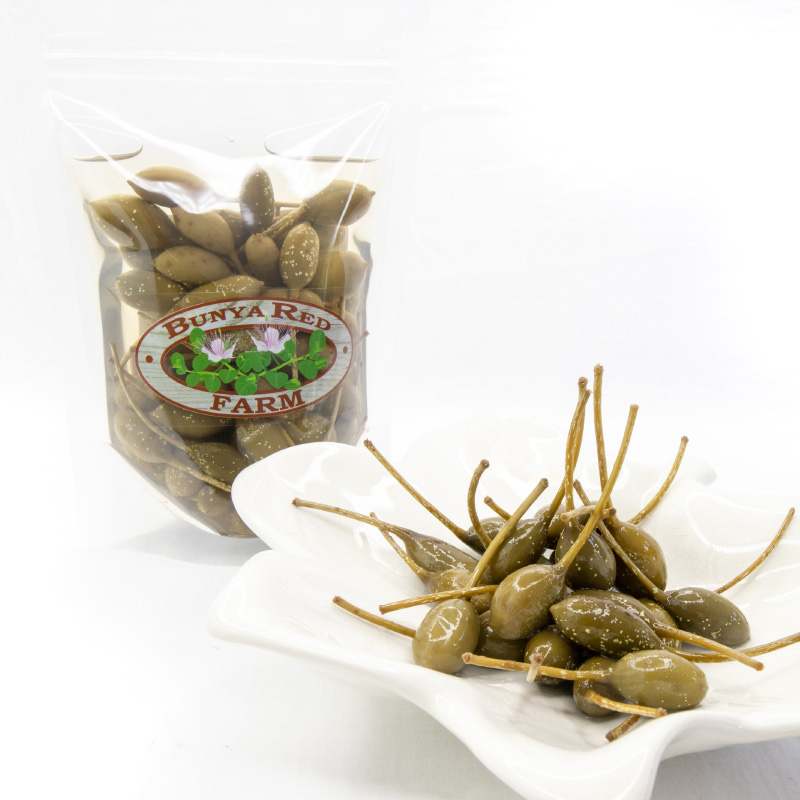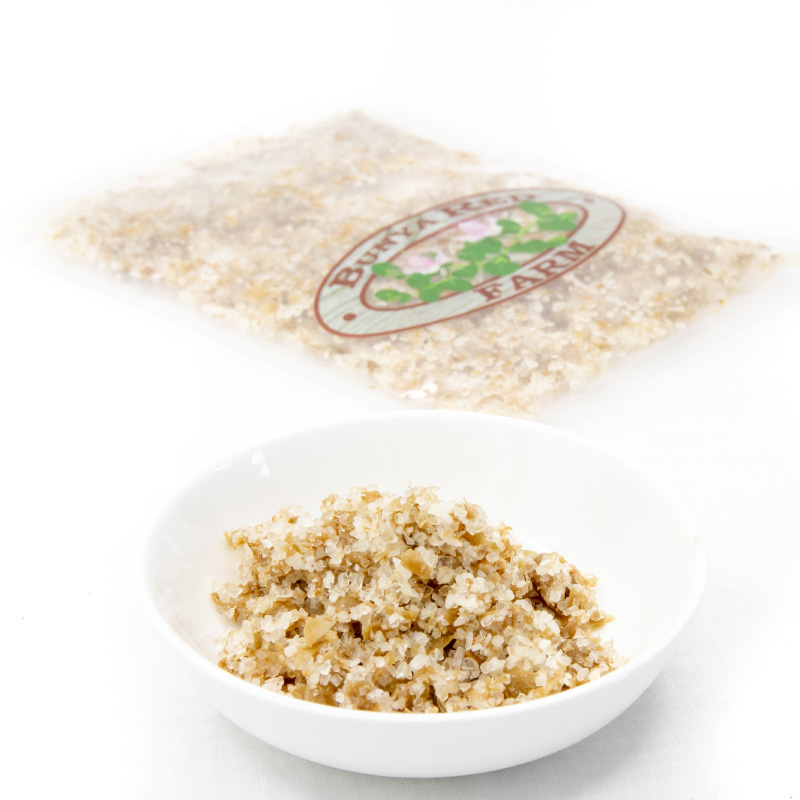OUR FARM
Capers & Caperberries
Queensland’s own chemical-free, Bunya Red Farm Capers are grown in the rich red soil looking out to the Bunya Mountains in the South Burnett. With our Mediterranean climate we chose to diversify our 160 acre property to include capers. They share the land with a peanut/sorghum/wheat/corn crop rotation, cattle, alpacas, a veggie patch, guinea fowl, and our loved cats and dogs.
Bunya Red Farm Capers are handpicked, washed and salted with Australian sea salt. After curing, they are hand graded, packed, ready for you to enjoy. Great in salads, pasta, on pizza, eggs benedict, smoked salmon… imagine how capers can add that zing to your recipes – fresh and fruity, with an intensity of flavour. Yum!
Caperberries are also handpicked, washed and put into a brine, made with Australian sea salt. After curing, these too are hand graded, and packed with Granite Belt white wine vinegar. Caperberries can be used in cooking, or chopped into salads, or just added as an alternative to an olive on a cheese plate with a wine!
What are they?
Capers are the unopened flower bud of the caper plant (Scientific name: Capparis spinosa). The plant is a low growing, but well spread out bush. The plants have grown well over the years. Their size is not quite the expected height of about 1 metre, but they do spread to about 3.5 – 4 metres by the end of the season. They are not nasturtiums.
The caper plant originates from a Mediterranean climate. Here in the South Burnett, we experience cool winters (as low as -4 degrees in 2012) and hot dry summers (usually high 30’s to low 40 degrees in December to February).
Our caper season in Queensland runs from September to March/April, if it is still hot enough. As the temperatures cool into autumn, the plants growth slows and it gets ready for winter. By mid-winter the caper plants are pruned back quite hard, to wait for the warmth of Spring to wake up again.
As the caper bush grows out during each season, the lower branches provide its own mulch cover on the ground. Perfect growing conditions produces more capers than can be picked. The buds quickly grow quite big. These are left on the bush, and they burst into flower. The flowers are beautiful, white petals with many long purple stamens. Each flower only lasts for 1 day. (Here today, gone tomorrow).
If the flower has been pollinated, it sets an oblong caperberry (the fruit) which can be picked after 4 to 6 weeks on the bush. There are lots of bees in the caper paddock each season doing a great job. It takes 4 – 6 weeks to grow into a caperberry, ready to be handpicked. If the caperberry is allowed to grow too large and round, the seeds within are bitter and hard. Not too good for eating.
The young shoots and leaves can also been eaten either fresh or preserved.
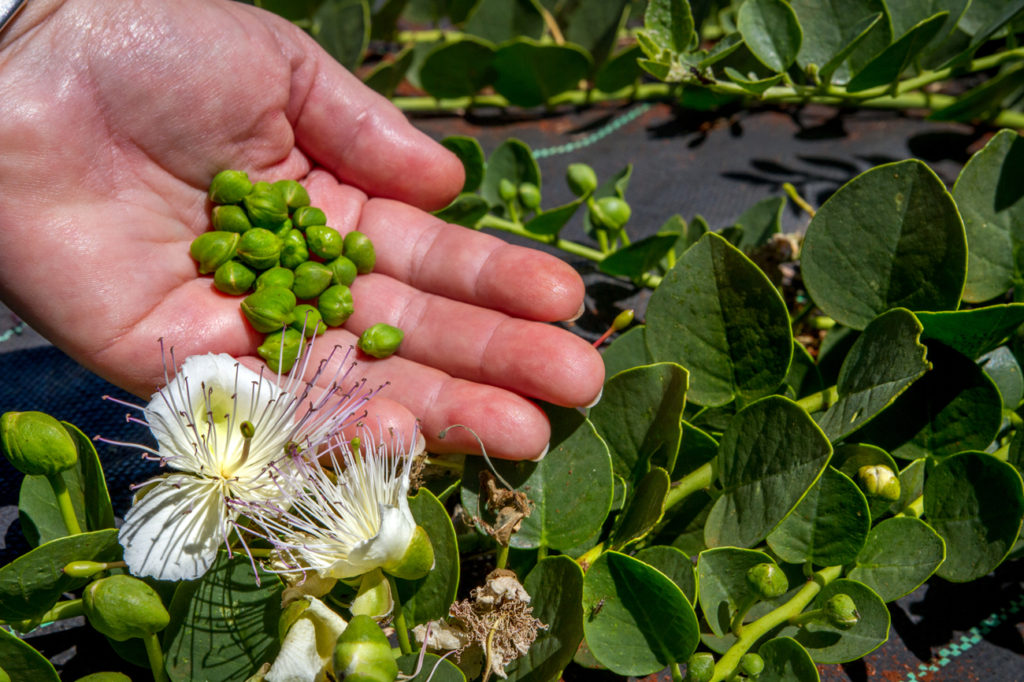
How do they grow?
On a gentle ridge of Bunya Red Farm we had cultivated an area of about 2 acres to plant our capers. The rich red soil is well drained with a pH of 6.4 – 6.8 across the paddock. Our first 150 caper plants (trial plot) were planted on raised mounds on 11th & 12th November 2011. The slope allowed us to run water direct to the plants by gravity fed drippers.
We were the first to grow a commercial crop of capers in Queensland.
As they went into the prepared holes, we added extra natural fertilizers and lime. Each row had a different mixture, and one row had none at all (Row 7). This was our test row, to see how our plants would manage on the existing nutrients in the soil alone. Experimenting with NatraMin Cal-S, Seamungus and alpaca poo, each were chosen for their benefits for soil and plant nutrition. After a slow start, but 3 years in, Row 7 had caught up to all the other rows for growth and production. Initially the rows were mulched with aged lucerne hay over weed matting.
Caper plants do not like wet feet or humidity. They are better suited to the dry, less humid conditions in the South Burnett. Sometimes it does manage to rain in summer. At those times we only get an average caper crop, as the plants slow their growth and production. However, when it does rain, the peanuts (summer crop) are very happy and produce better. The beauty of diversification.
The caper paddock has expanded now to over 400 plants.
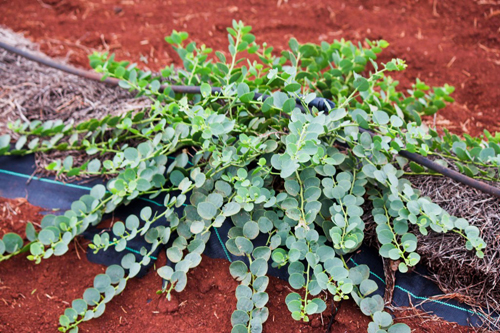
Health Benefits
Capers are very low in calories and has 23 calories per 100g. They contain anti-oxidants, phytonutrients and vitamins A, K, niacin. Niacin can help lower cholesterol.
Harvest
The variety of caper bush we have are ‘spineless’ they do not have the spikes, or thorns on the bush, as would be found on their Mediterranean cousins. This definitely makes for easier picking. Possessing flexible knees and body, or to sit on the ground is the easier way to get around a plant to pick the smaller than pea sized capers.
We start hand picking sometime in September most years. Sometimes early, sometimes late. It all depends when the temperatures start to warm up after winter.
Part of our daily routine during the season (up until March/April – temperature dependent) is to visit the ‘caper paddock’ – be it for harvesting, by hand, insect and pest monitoring and control, or pulling the occasional weed (they generally don’t grow if it doesn’t rain), fertigation (a cross between fertilisation & irrigation), or just to enjoy the view, the fresh air and watch the plants grow.
Once autumn weather is upon us again, we mulch and feed our caper plants in preparation for the much cooler winter temperatures ahead. The plants are pruned right back to nearly the stump. They are dormant throughout the winter, allowing us to take a much needed break. Once the temperatures start to rise, and spring is in the air, the plants start to send out new shoots and branches ready for a new season to start once again.
Multi Award Winning
2021 Delicious Harvey Norman Produce Awards – State Finalist – Capers in Salt
2019 Delicious Harvey Norman Produce Awards – State Finalist – Capers in Salt
2018 Delicious Produce Awards – State Finalist – Capers in Salt
Award GOLD – 2017 Australian Food Awards – Capers in Salt
Award GOLD – 2013 Sydney Royal Fine Food Show – Capers in Salt
Award SILVER – 2015 Sydney Royal Fine Food Show – Capers in Salt
Award BRONZE – 2015 Sydney Royal Fine Food Show – Caperberries in White Wine Vinegar
Award BRONZE – 2014 Sydney Royal Fine Food Show – Caperberries in White Wine Vinegar

BUNYA RED FARM
Premium Caper & Caperberries
Some of our award winning products – all available for purchase online.
